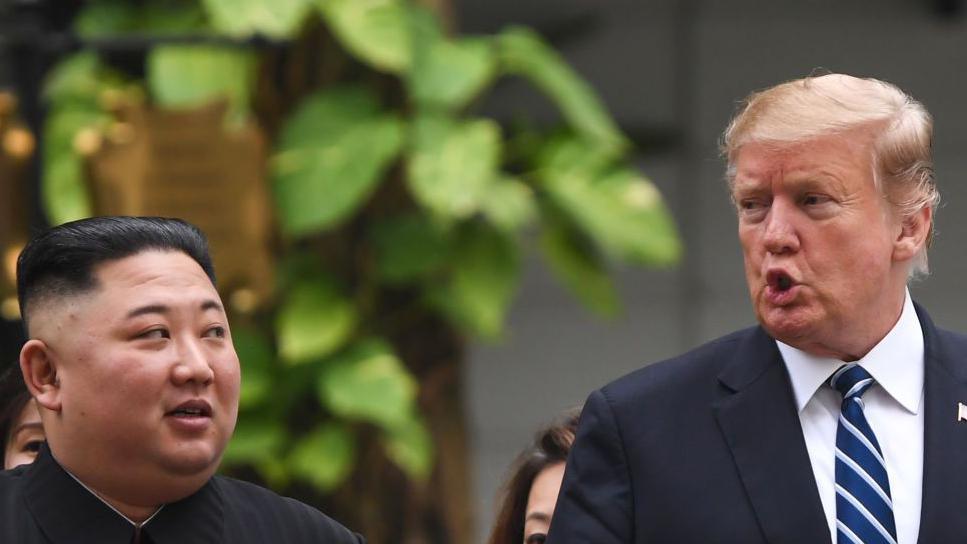Steve Rosenberg: Russia is staying quiet on Trump's nuclear move

Former Russian President Dmitry Medvedev (right) has sparred with Donald Trump on social media in recent days
- Published
Could this be the first time in history a social media spat triggers nuclear escalation?
President Donald Trump, offended by posts by former Russian President Dmitry Medvedev, says he's ordered two nuclear submarines to move closer to Russia.
So, how will Moscow respond? Are we on a path to a nuclear standoff between America and Russia? An internet-age version of the 1962 Cuban Missile Crisis?
I doubt it, judging by initial reaction in Russia.
Russian news outlets have been rather dismissive of Trump's announcement.
Speaking to the Moskovsky Komsomolets newspaper, a military commentator concluded that Trump was "throwing a temper tantrum".
A retired lieutenant-general told Kommersant that the US president's talk of submarines was "meaningless blather. It's how he gets his kicks".
"I'm sure Trump didn't really give any orders [about submarines]," a Russian security expert suggested to the same paper.
Kommersant also mentions that in 2017, Trump said that he'd despatched two nuclear submarines to the Korean peninsula as a warning to North Korea.
Yet not long after, Trump held a meeting with North Korean leader Kim Jong Un.
So, bizarrely, might Donald Trump's latest submarine deployment be a precursor to a US-Russia summit?
I wouldn't go that far.
But the reaction from the Russian authorities has been interesting.
At time of writing, there hasn't been any.
Not from the Kremlin. Not from the Russian foreign ministry. Nor the defence ministry.
And I've seen no announcement about Russian nuclear submarines being positioned closer to America.
Which suggests that either Moscow is still studying the situation and working out what to do, or that Moscow doesn't feel the need to react.
The Russian press reaction I mentioned earlier suggests it's the latter.

After clashing on social media, Kim Jong Un and Donald Trump met several times
Trump had been sparring with Medvedev on social media for several days.
After the US president had reduced his 50-day deadline for Russia to end its war in Ukraine to less than two weeks, Medvedev posted that Trump was "playing the ultimatum game with Russia…Each new ultimatum is a threat and a step towards war".
Trump responded: "Tell Medvedev, the failed former Russian president who thinks he is still in power, to be careful what he says. He is entering very dangerous territory."
Medvedev's next post contained a reference to "Dead Hand", the automatic nuclear retaliation system developed in the Soviet Union.
Clearly, that did not go down well with the White House chief.
When he was Russia's president, between 2008 and 2012, Medvedev was seen as a relatively liberal figure.
"Freedom is better than no freedom" he was famously quoted as saying.
But he has grown increasingly hawkish. Since Russia's full-scale invasion of Ukraine he has gained a reputation for bombastic, anti-Western social media posts. Most of them have passed unnoticed, since he is not viewed as the voice of the Kremlin.
Suddenly he has been noticed: by the President of the United States.
And not just noticed. He's got right under Trump's skin.
It's one thing to dislike a social media post. We've all been there.
But to dislike it so much you deploy nuclear submarines feels like overkill.
So why has Trump done it?
Here's Trump's own explanation from his interview with Newsmax: "Medvedev said some things that are very bad, talking about nuclear. When you mention the word nuclear my eyes light up and I say we better be careful, because it's the ultimate threat."
But Medvedev has long been accused of nuclear sabre-rattling via social media. It's nothing new.
What is clear is that Trump took the recent Medvedev posts very personally, and reacted accordingly.
Might there also be a strategy at play? Unpredictability feels like a big part of Trump's way of doing things, in business and in politics; taking unexpected decisions that can put rivals and opponents off balance before talks or during a negotiation.
On ending the war in Ukraine, for example.
Surprise submarine deployments may well fall into that category.
Related topics
- Published1 August

- Published28 July
